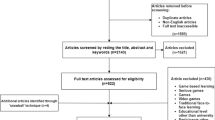Abstract
We believe that an effective e-learning game can encourage the learners’ enjoyment and catalyst their learning initiative, so as to cumulate their learning experience, and to improve their knowledge. However, challenges remain in terms of what tasks included and arranged in a “complexity” game design for the knowledge level enhancement. Thus, this study presents the design guidelines based on the Freitas and Oliver four dimensions game-design evaluation framework and stressed the Bloom six levels of knowledge within the cognitive domain to interpret game tasks arrangement. These guidelines was applied to design a e-learning games VIEW (Virtual Investment Education World) which includes the investment tasks of virtual stock market, financial news, investment course, forum, and so on. By employed financial textbooks, the VIEW knowledge pool was built. In order to increase the complexity of the game, the embedded levels of knowledge were testified by some faculty iteratively.
Access this chapter
Tax calculation will be finalised at checkout
Purchases are for personal use only
Preview
Unable to display preview. Download preview PDF.
Similar content being viewed by others
References
Baumann, K., Thomas, B.: User Interface Design for Electronic Application, ch. 17. Taylor & Francis Inc., New York (2001)
Bloom, B.S.: Bloom Taxonomy of educational objectives, Allyn and Bacon, Boston, MA. Pearson Education, London (1984)
Foreman, J.: NEXT-Generation-education technology versus the lecture. EDUCAUSE Review, 17–30 (July/August 2003)
Freitas, S.D., Olive, M.: How can exploratory learning with games and simulations within the curriculum be most effectively evaluated? Computer & Education 46, 249–264 (2006)
Fu, F.L., Chen, W., Wiu, C.F.: Investigating the interest of on-line learning. In: Proceeding of E commerce and digital life conference, Taipei, Taiwan (March 2005)
Galarneau, L.: The elearning edge: leveraging interactive technologies in the design of engaging, effective learning experiences. In: Proceedings of e-Fest, Wellington, New Zealand (2005)
Harden, R.M., Stamper, N.: What is a spiral curriculum? Medical Teacher 21(2), 141–143 (1999)
Kiili, K.: Digital games-based learning: Towards an experiential gaming model. The Internet and Higher Education 8(3), 3rd Quarter, 13–24 (2005a)
Kirriemuir, J., Mcfarlane, A.: Report 8 Literature Review in Games and Learning, Graduate School of Education, University of Bristol (2004), http://www.nestafuturelab.org/research/reviews/08_01.htm
Nonaka, I., Umemoto, K., Sasaki, K.: Managing and Measuring Knowledge in Organizations. In: von Krogh, G., Roos, J., Kleine, D. (eds.) Knowledge in firms: Understanding, managing and measuring knowledge, pp. 146–172. Sage, Thousand Oaks (1998)
Prensky, M.: In Educational Games, Complexity Matters – Mini-Games are trivial – but “Complex” games are not. Education Technology 45(4), 22–28 (2005)
Siang, A.C., Rao, R.K.: Theories of learning: a computer game perspective. In: Proceedings of the IEEE Fifth International Symposium on Multimedia Software Engineering (ISMSE 2003) (2003)
Sweetser, P.: An Emergent Approach to Game Design –Development and Play. Unpublished doctoral dissertation, School of Information Technology and Electrical Engineering, The University of Queensland University of Missouri (2006)
Virou, M., Katsionis, G.: On the usability and likeability of virtual reality games for education: the case of VR-ENGANGE. Computer & Education 50(1), 154–178 (2008)
Author information
Authors and Affiliations
Editor information
Editors and Affiliations
Rights and permissions
Copyright information
© 2009 Springer-Verlag Berlin Heidelberg
About this paper
Cite this paper
Yu, SC., Fu, FL., Su, C.H. (2009). EGameDesign: Guidelines for Enjoyment and Knowledge Enhancement. In: Wang, F.L., Fong, J., Zhang, L., Lee, V.S.K. (eds) Hybrid Learning and Education. ICHL 2009. Lecture Notes in Computer Science, vol 5685. Springer, Berlin, Heidelberg. https://doi.org/10.1007/978-3-642-03697-2_4
Download citation
DOI: https://doi.org/10.1007/978-3-642-03697-2_4
Publisher Name: Springer, Berlin, Heidelberg
Print ISBN: 978-3-642-03696-5
Online ISBN: 978-3-642-03697-2
eBook Packages: Computer ScienceComputer Science (R0)




